The evolution of serfdom. From St. George's Day to classic slavery
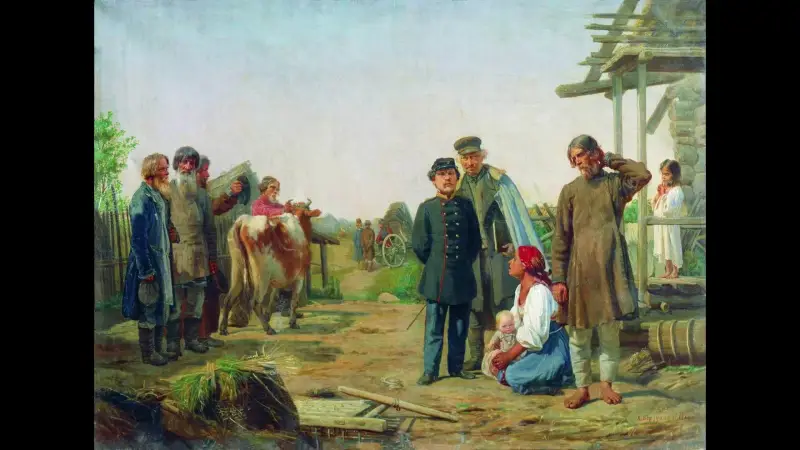
A. I. Korzukhin. “Collecting arrears (The last cow is taken away)”, 1868
On March 3 (February 19), 1861, Emperor Alexander II signed the Manifesto “On the most merciful granting to serfs of the rights of free rural inhabitants” and “Regulations on peasants emerging from serfdom,” which included 17 legislative acts. Peasants were to receive personal freedom and the right to dispose of their property.
After this, the sycophants began to call the emperor “Liberator,” but the peasants were sure that they had been deceived once again. Their indignation was so great that anti-government protests were recorded in 42 provinces, and in some places they had to be suppressed with the participation of the regular army.
What is the reason for such “ungratefulness”?
Let's not rush and get ahead of ourselves, let's start the story about serfdom, its evolution and abolition in order.
Yuryev's Day
For a long time, the peasants maintained some independence from the landowner: once a year they had the right to move from one landowner to another, which, of course, greatly eased their situation and limited the owner's arbitrariness. No one wanted to be left without peasants, and the nobles, especially those who were not rich, were often forced to even curry favor with them to some extent.
The “peasant exit” fell on December 9 (November 26) - St. George’s Day, when the harvest was completed and the final settlement was made between the parties. And therefore, among the people, this date was called Yuryev (or Yegoryev) day.
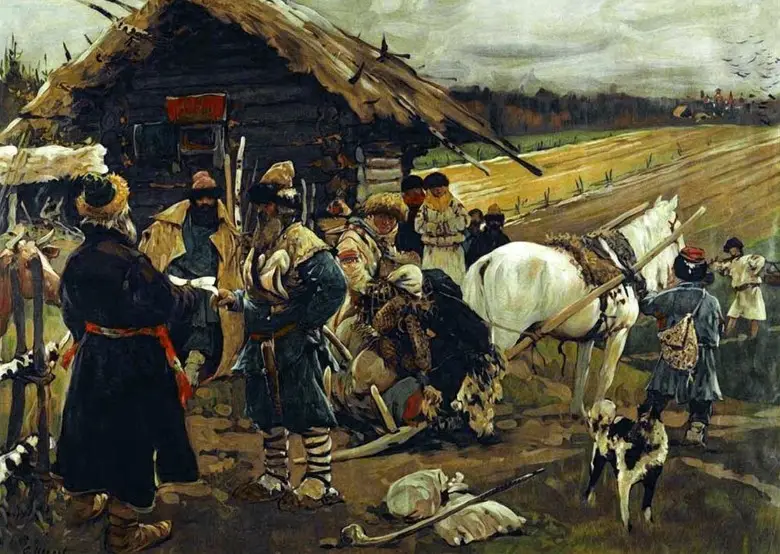
S. Ivanov. "St. George's Day"
Of course, when making payments, the landowners tried to pay less, and therefore the word “to cheat” entered the Russian language - that is, to deceive. The Sudebnik of 1497 (a set of laws approved under Ivan III) gave peasants 14 days to “exit” - they could change their owner a week before the autumn day of veneration of St. George and a week after it.
On the way to serfdom
On December 6 (November 26), 1590, by decree of Tsar Fyodor Ioannovich, the usual “exit” was prohibited, male peasants, their wives and children were “attached to the land” and had to work for their landowner for life - this is how the saying “Here you go, grandmother, and St. George's Day."
However, in 1597, the “Decree on Prescribed Years” was issued, according to which, if a peasant nevertheless left the landowner, he had the right to file a petition for a search and return him only within 5 subsequent years. If during this time the fugitive was not found, he was assigned to a new owner. And in 1649, under Tsar Alexei Mikhailovich, the Council Code was adopted, according to which the landowner received the right to search for fugitive peasants indefinitely.
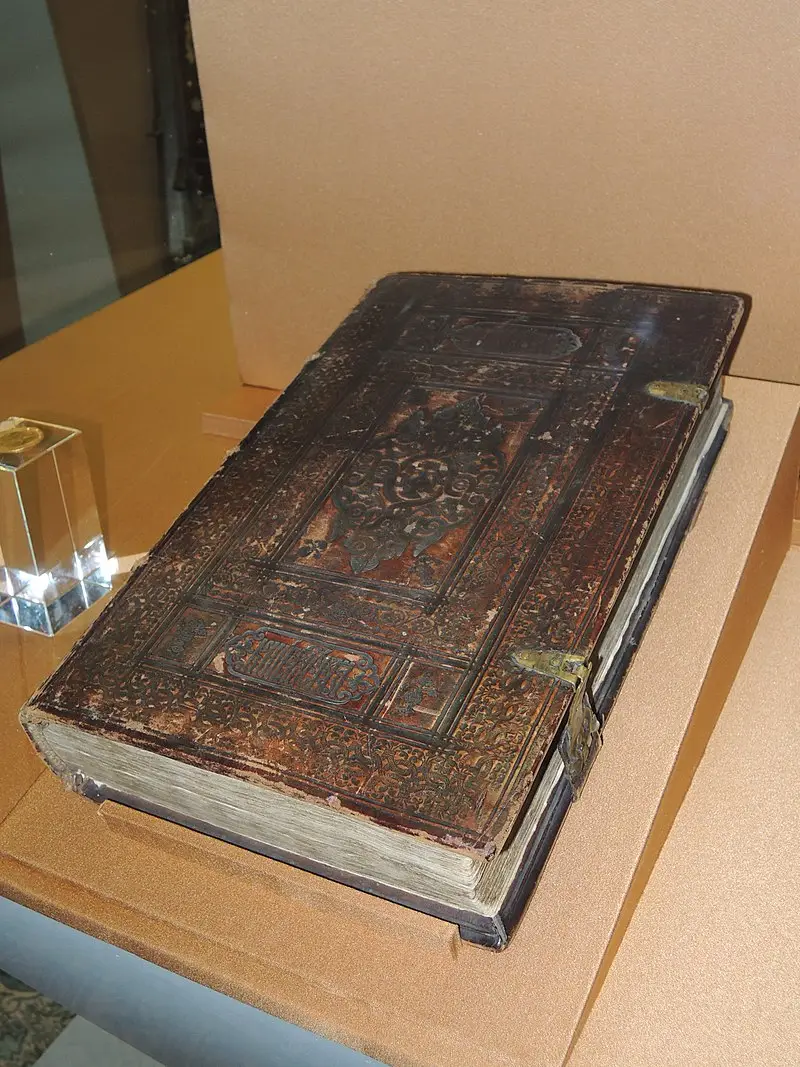
Cathedral Code of 1649
Peter I issued a decree according to which all subjects had to determine their position. Illegitimates, freedmen, children of soldiers, captured foreigners, ordinary clergymen, and finally, just vagabonds had to find a master. Those who evaded were assigned to some courtyard by police order.
As a result, by the end of the reign of Peter I, serfs accounted for more than half of the adult male population of the empire.
"The Golden Age of Catherine"
In “Notes on Russian stories XVIII century" A. S. Pushkin wrote about Catherine II:
The liberalism of this empress existed only in words. Her contemporary, the well-known Jean-Paul Marat, wrote about this:
Some “projectors,” deceived by the empress’s external liberalism, proposed declaring free all children born after 1785, when Catherine II issued the “Charter of Grant to the Nobility.” In this document, the nobles were officially declared a “noble class”, they were exempt from paying taxes, corporal punishment and compulsory service; Now only the court of the nobility could judge them.
In response to these proposals, Catherine, without hesitation, stated:
It was under Catherine II that patriarchal serfdom in Russia turned into classical slavery. Immediately after the assassination of Peter III, his decree limiting the personal dependence of peasants on landowners was canceled. This emperor managed to free the monastery peasants, giving them arable land for eternal use, for which they had to pay a monetary rent to the state treasury.
However, many of them were again enslaved under Catherine II - the empress needed peasant souls to distribute them to her supporters and favorites. For the first time in Russian history, Catherine II allowed the sale of serfs separately from the land. It was no longer the Crimean Tatars in the Cafe, but Russian landowners who were selling Russian people like cattle - in four all-Russian slave markets: in St. Petersburg, Moscow, Nizhny Novgorod, Samara.
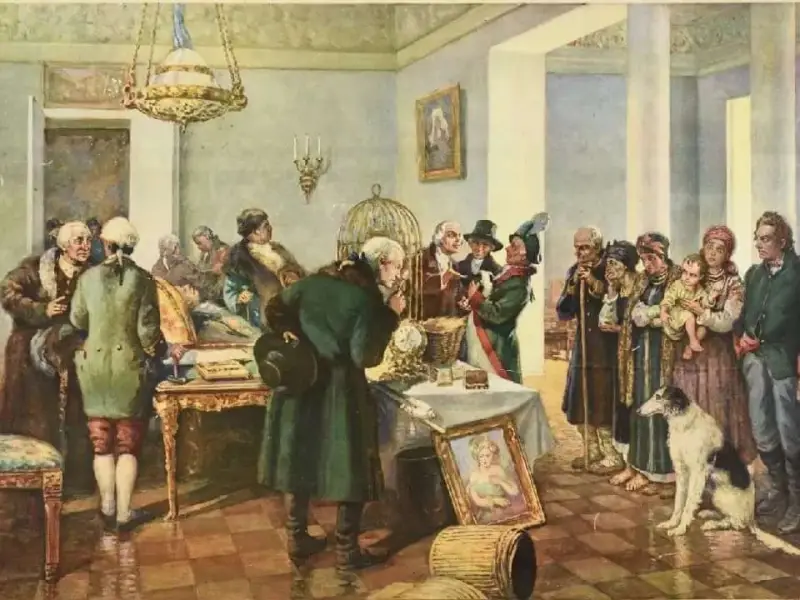
K. Lebedev. Selling serfs at auction. 1910
And also - at many small local bazaars and through advertisements in newspapers. Often a wife was separated from her husband, a mother from her children.
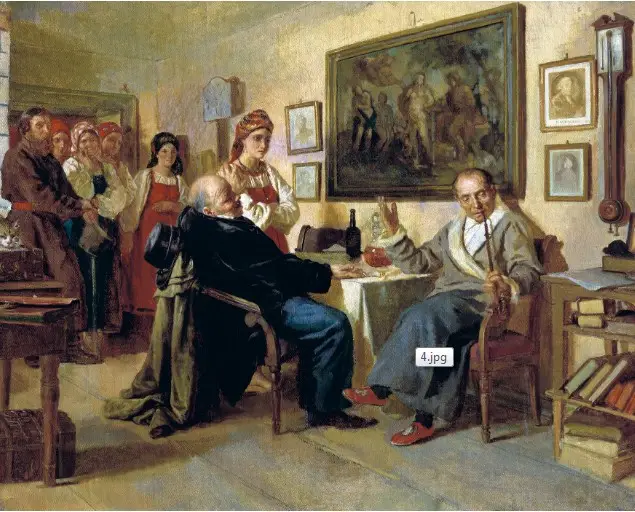
N. Nevrev. "Bargain. Scene from serf life"
Here are some advertisements that could be read in St. Petersburg newspapers of that time:
“In Bolshaya Kolomna, on the banks of the Catherine Canal, in a stone house, at No. 285, a boy who knows how to comb his hair and a milk cow are for sale.”
“In Sergeevskaya Street, in the 4th block, opposite the church itself, in a stone house at No. 397, a 15-year-old boy, also a bekesh, covered with a blue set with special lapels, a sable hat and a reed cane with a gold knob is for sale.”
A. S. Pushkin wrote about the serfdom activities of Catherine II:
And A.K. Tolstoy also did not ignore this topic. In the parody “History of the Russian State from Gostomysl to Timashev”, of all the acts of Catherine II, only the introduction of serfdom in Little Russia is mentioned:
Order will blossom, -
They wrote her courteously
Voltaire and Deiderot, -
Only the people need
To whom you are a mother
Rather give freedom
Rather give freedom. ”
"Messieurs," objected to them.
She, - vous me comblez "(you are too kind to me) -
And immediately attached
Ukrainians to the land."
Serfdom in Little Russia was introduced in 1783. Even at the beginning of the twentieth century, in these areas they sang a folk song with the following words:
What have you done?
The steppe, the wide edge is cheerful,
I gave Panam away.”
The most disgusting thing was that many villages with living people were given away by Catherine II not for real merit in military or public service, but for the “valor” shown on her bed. A.S. Vasilchikov, for example, in less than two years of “service” in the empress’s bedroom became the owner of 7 thousand peasant souls (remember that only the souls of male peasants were taken into account; more women must be added). In a year and a half, P.V. Zavadovsky received 6 thousand souls in Little Russia, 2 thousand in Poland, 1 in Russian provinces. I. N. Korsakov in sixteen months - 800 thousand souls in Poland. More than 4 thousand souls were received from Catherine by her last favorite - the very insignificant and pathetic Platon Zubov.
Since it was not necessary to serve under this queen (particularly vain nobles could simply be listed in the guards regiments without appearing in them for years), a whole caste of “wild landowners” arose, who created not only harems of underage girls, but even real torture chambers, in which employed certified European specialists.
Among the latter, the Penza landowner Nikolai Struisky became especially famous. He also had fun shooting at living people in a specially equipped shooting range (serf men had to try to dodge bullets while moving in a limited confined space), and throwing unwanted ones into a cage with a tiger brought from India.
And the Zaraisk landowner and retired lieutenant general Lev Izmailov (who is considered the prototype of the landowner Troekurov from Pushkin’s story “Dubrovsky”) loved to lock his servants in a room with a wild bear. In his house, Izmailov kept 30 girls aged 10 to 12 years, who were expelled as soon as they became at least a little like adult women. Izmailov raped his own daughter, Nymphodora Fritonovna Khoroshevskaya, who was born by one of the inopportunely matured concubines, when she was 8 years old, and at the age of 13 he sent her to work at a potash factory. Fearing that his serfs might say too much during confession, Izmailov simply forbade them to go to church.
It must be said that pedophiles were quite common among the nobles of the times of Catherine II and Alexander I. State official A. Zabolotsky-Desyatovsky testifies:
The most advanced and sophisticated serf owners disguised their harems as theaters and choirs, for example, General Sergei Kamensky, the son of Catherine’s Field Marshal Mikhail (he was killed by desperate serfs) and the brother of Suvorov’s favorite student Nikolai.
But N. Sheremetev and N. Yusupov became most famous in this field.
The first one had a special ritual: every evening he left his handkerchief with one of the actresses, which he came for at night. However, then the story of Suleiman the Magnificent and Roksolana (as well as Peter I and Martha Skavronskaya) repeated itself: a slave with a strong character “tamed” and subjugated her master. The role of Roksolana was performed by Praskovya Gorbunova (Zhemchugova).
And Yusupov became a pioneer of Russian striptease and BDSM: after the performances, he forced the actresses to undress in front of the guests to the music, and then he and his friends beat the unfortunate girls with whips. Griboedov wrote about such “theaters”:
At the fortress ballet was driven off on many waggons
From mothers and fathers of rejected children.”
From the further text it becomes clear that Griboyedov reproaches the aristocrats not for tearing children away from their parents, but for mismanagement and inability to conduct business, which is why they then have to sell off already trained serf actors and actresses:
Cupids and Zephyrs all
Sold out individually.”
From the point of view of a zealous owner, of course, it is extremely reprehensible to spend a lot of money on preparing a theater troupe, making “all Moscow marvel at the beauty” of actors and especially actresses - and not earn anything from it.
It is curious that some people call the already mentioned pedophile Izmailov, who at the end of his life moved to Moscow, ran a theater there and went bankrupt, as the prototype of the “theater” of Griboyedov’s play. Others believe that Griboyedov had in mind a certain landowner Rzhevsky, who, according to A. Ya. Bulgakov, “spent 4 souls on these farces” and was eventually forced to sell off his troupe. The most talented of its actors and actresses were acquired by the management of the imperial theaters.
In Rzhevsky’s troupe, contemporaries especially singled out Kharlamova, who “had an extraordinary aplomb” (a ballet term for high jumping technique and confidence in rotation). This girl, as well as Sitnikova, Karaseva, “the two Mikhailovs” (other ballerinas of the Rzhevsky Theater) were lucky: having already become state serfs, they continued their stage career and completed their studies with the famous dancer Güllen. True, their further fate is unknown: what happened to them when, due to their age, they could no longer go on stage?
By the way, according to the notes of A.S. Pushkin, it was the serf actress Natalya Ovoshnikova who became his first woman. This happened when the future poet was 14 years old; he himself admitted that he was an ugly and homely teenager, and it is unlikely that this woman gave herself to him for love.
Look at the painting by Nikolai Kasatkin, which was painted even before the revolution - in 1910), it is called “A serf actress in disgrace, breastfeeding a master’s puppy”:
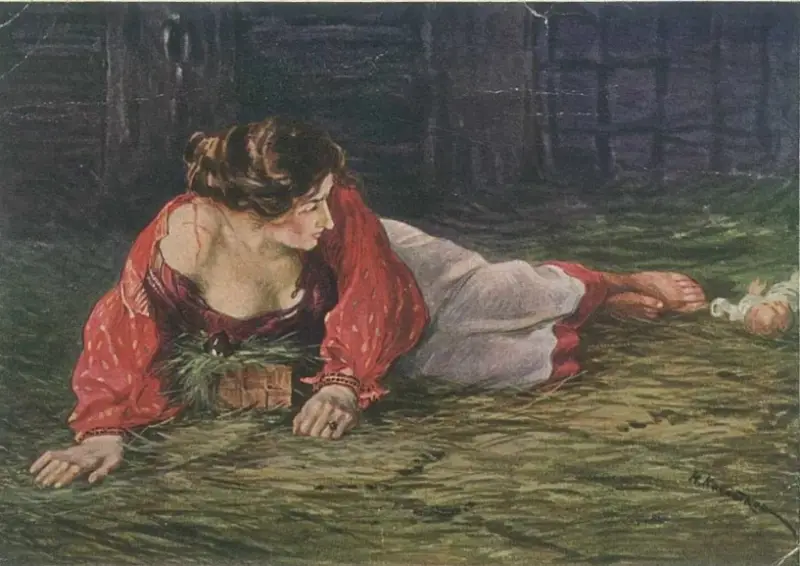
This is by no means the artist’s fantasy; you can read about one such landowner who forced serf peasant women to breastfeed puppies in Vladimir Korolenko’s story “On a Cloudy Day”:
- Not true! – Lena screamed, as if she had been stung.
“God kill me,” the coachman interjected indifferently.”
Let's go back to the time of Catherine II. This empress was very frightened by the investigation into the case of Daria Saltykova, whom the peasants called “Saltychikha” and “Ogress”.
On the one hand, a terrible picture of landowner tyranny opened up - a truth that she did not want to know.
On the other hand, this investigation aroused the anger of Russian aristocrats, whom Catherine II, who had no rights to the Russian throne, never dared to contradict. And therefore the peasants were officially forbidden to file any complaints against their masters.
As a result, this “enlightened empress” brought the country to a real civil war, in which Emelyan Pugachev “commanded” the nobles with his “personal decree”:
In “Notes on the Rebellion,” A. S. Pushkin wrote that this war “shaken Russia from Siberia to Moscow and from the Kuban to the Murom forests”:
The class of clerks and officials was still small and decisively belonged to the common people. The same can be said about officers who have gained favor from among the soldiers. Many of these latter were in Pugachev’s gangs.”
At the same time, Pugachev pretended to be Emperor Peter III, who managed to escape from those who wanted to kill him “the prodigal wife Katerina and her lovers” - that is, the uprising was monarchical (!).
Another person who greatly frightened Catherine II was A. Radishchev, whom she, as you know, called “a rebel worse than Pugachev” and accused of conspiracy, treason, and even an attempt on the sovereign’s health.
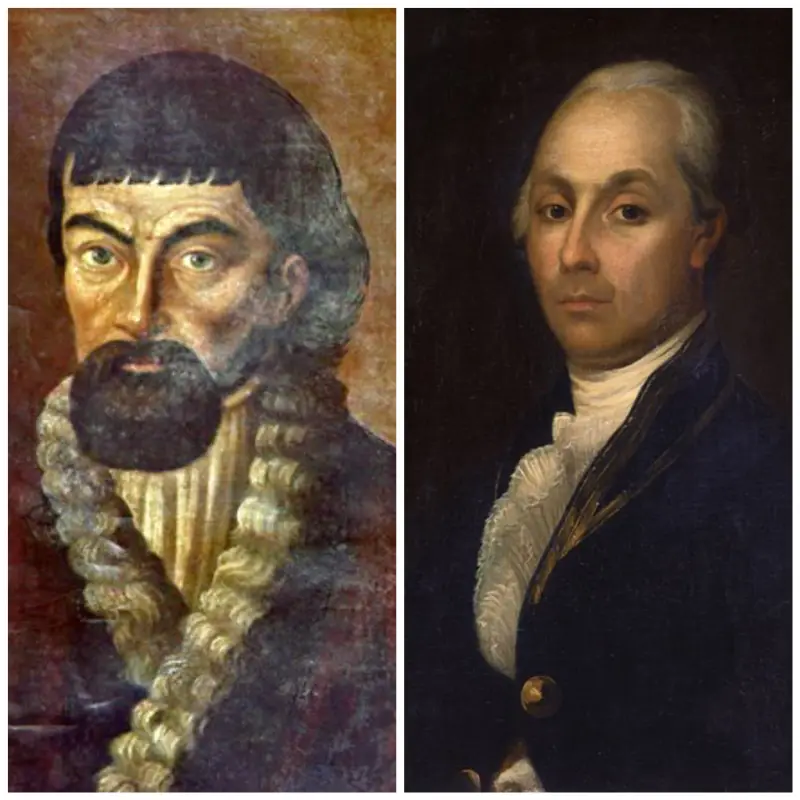
Pugachev and Radishchev - rebels who terribly frightened Catherine II
On the order to expel Radishchev to Siberia, Catherine hypocritically wrote:
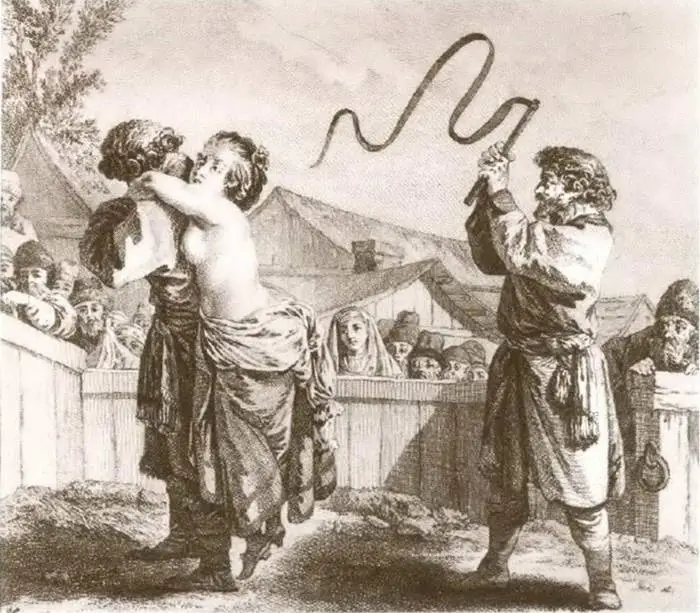
Punishment with a whip. Illustration for the book “Journey to Siberia” by Abbot Chappe d'Autroche. J. Leprince. Mid-XNUMXth century
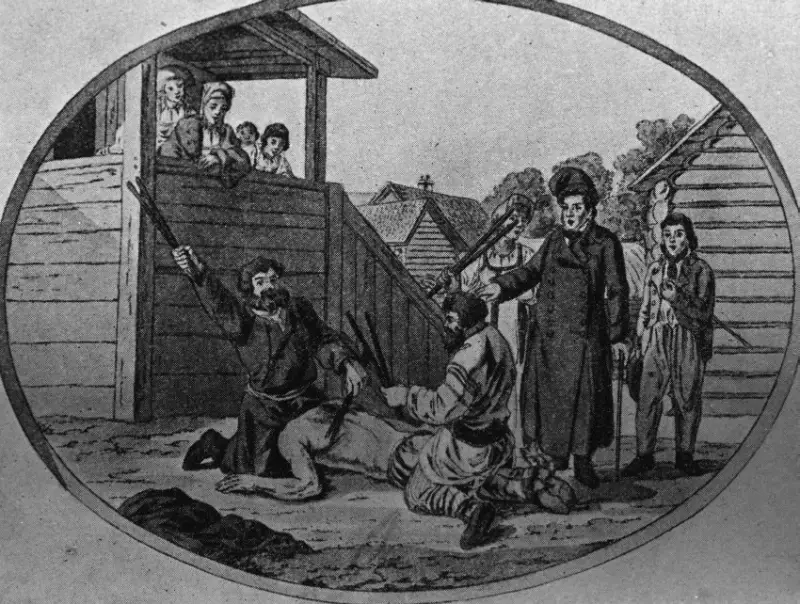
H. Geisler. Punishment of the serf by the gods in the presence of the landlord's family and the yard. Engraving. End of the 18th century
What caused such fear and such anger of this sovereign serfdom?
For example, these lines:
He considered himself to be of the highest rank, considered the peasants to be cattle given to him (he almost thought that his power over them stems from God), and uses them for work at will...
He put them on arable land (that is, corvée), took away all their land, bought all their cattle at a price that he himself determined, forced them to work all week for himself, and so that they would not die of hunger, he fed them in the master's courtyard, and then only once a day, and to others he gave a month's rent (rents) out of mercy. If anyone seemed lazy to him, then he flogged him with rods, whips, batogs or cats, depending on the extent of laziness; for actual crimes, such as stealing not from him, but from strangers, he did not say a word...
It happened that his men robbed a traveler for food on the road, and then killed another. He did not bring them to court for this, but hid them with himself, declaring to the government that they had fled; saying that there will be no profit for him if his peasant is whipped and sent to work for his crime. If one of the peasants stole something from him, he flogged him for laziness or for a daring or witty answer, but in addition he put stocks and shackles on his feet, and a slingshot around his neck.”
The work of Radishchev and A. Pushkin, whose family also owned serfs (about one and a half thousand in four villages), was very hurt; the poet did not intend to free them and even, unlike Onegin, did not replace corvee with quitrent. But he refused to consider himself an ordinary slave owner and did not want to know the unpleasant truth. In the rather shameful “Journey from Moscow to St. Petersburg,” which is not studied at school, Pushkin paints the following blissful picture of the life of serfs:
And Nikolai Gogol advised the nobles to give the following explanations to their peasants:
This is how the man was “unlucky”, from the point of view of Nikolai Vasilyevich: he was not born a serf, but a nobleman. And now he is forced to “bear this heavy cross” - “to be a landowner” and “to command.”
The disenfranchised deep Russian people have not forgotten their humiliations. In February 1918, Alexander Blok wrote an article “Intellectuals and Revolution”, which included the following words:
- Because the girls were raped and flogged there: not at the master's place, as at the neighbor's.
Why are centenary parks being felled?
- Because for a hundred years, under their spreading linden and maple trees, the gentlemen showed their power: they poked a beggar in the nose - a money-maker...
I know what I am saying. You can't get around this with a horse. There is no way to hush this up.”
Reform attempts
Paul I, who came to power after the death of Catherine II, limited corvée to three days a week, forgave peasants for arrears in the per capita tax in the amount of more than 7 million rubles, prohibited the sale of peasants without land and the fragmentation of peasant families when they passed to other owners. Including this, he was soon declared crazy by the Russian aristocrats, and then killed.
Alexander I in 1803 issued the “Decree on Free Plowmen”, according to which landowners had the right to give “freedom” to their serfs for a ransom, or for an obligation to work in his fields. Over 25 years, under this decree, less than 0,5% of all serfs were able to gain freedom.
The project for the liberation of all peasants “from above” was proposed by Alexey Andreevich Arakcheev - the same one about whom Pushkin wrote:
And Arakcheev himself said:
And, I must admit, Alexey Andreevich demanded much more from himself than from others. A.I. Mikhailovsky-Danilevsky (author of the first official history of the Patriotic War of 1812) characterized Arakcheev as follows:
Serious experts believe that Arakcheev, who in 1812 headed the rear service of the Russian army and the training of reserve units, should deservedly be placed on a par with Kutuzov and Barclay de Tolly.
In 1818, it was Arakcheev who drew up and presented to Alexander I a project for the treasury to buy out landowners’ estates “at voluntarily established prices” in order to “assist the government in abolishing the serfdom of people in Russia.” According to Arakcheev’s plan, the government was supposed to gradually buy out peasants from those landowners who were ready to part with them, and with land - two dessiatines per capita, that is, 2,18 hectares.
In principle, many landowners who had long been in deep debt could agree to these conditions, especially since most of the land remained their property, and they could rent it out to the same peasants.
But Alexander I had already dropped the mask of a liberal. Instead, he appointed Arakcheev "chief of staff over military settlements." Arakcheev was on his knees, begging him “not to create new archers.” Alexander replied:
The saddest thing is that in the Baltic (that is, Baltic) provinces of Estland, Courland and Livonia, Alexander I freed the peasants by 1819. But he rudely refused a delegation of liberal-minded Russian nobles, who in the same 1819 came to him with a project for the liberation of the serfs of the indigenous Russian provinces.
Apparently, to this emperor with one ounce of Russian blood in his veins, Lithuanians, Estonians and Latvians were closer and dearer than Russian peasants. However, the Baltic peasants did not receive land plots during liberation, and therefore before the revolution in St. Petersburg there was a saying in circulation:
In 1821, Nikolai Nikolaevich Novosiltsev (the author of the project “Charter of the Russian Empire,” which proposed establishing a bicameral parliament and guaranteeing civil liberties to free subjects of the empire) presented Alexander I with a project for the abolition of serfdom, in the creation of which M. S. Vorontsov and A. also participated S. Menshikov. As you probably guessed, the emperor rejected both projects.
Alexander I's successor, his younger brother Nicholas I, stopped the vicious practice of rewarding state peasants. By his decision, he forbade the landowners from sending peasants to hard labor. In 1833, it was prohibited to separate peasant families during the sale. In 1842, Nicholas I stated at a meeting of the State Council:
Under this emperor, the issues of liberation of serfs were discussed by more than a dozen commissions, whose proposals were defeated by the resistance of the landowners.
In 1842, the “Decree on Obligated Peasants” was issued, according to which the landowner, at his own request, could free the peasants who belonged to him with the allocation of a land plot - for paying quitrent or working off corvee. As you understand, there were not many of these among Russian landowners. Russian aristocrats, of course, were offended when Parisian newspapers wrote about them as “rich Russian slave owners,” but even the most desperate liberals did not want to give up slave-serfs.
However, the mood in society began to change.
We remember that the defenders of serfdom, among others, were Pushkin and Gogol. But Turgenev even despised his own serfdom mother; it was she who became the prototype of the cruel tyrant lady of the famous story “Mumu”. Turgenev wrote:
In my eyes, this enemy had a certain image, bore a well-known name: this enemy was serfdom.”
He even drew up a note justifying the need to abolish serfdom and handed it to A. Golovnin, the secretary of Konstantin Nikolaevich (the emperor’s brother), who had a reputation as a liberal. Konstantin did not even consider it necessary to respond to the great writer socially close to him.
During his reign, Nicholas I issued about a hundred decrees that were supposed to somehow alleviate the situation of the serfs - and the sheer number of these decrees indicates their ineffectiveness.
Nevertheless, the practice of self-ransoming of peasants spread, and gradually the share of serfs decreased from 58% to 35-40%.
And more than 5,5 million dessiatines of land and about 3 million dessiatines of forest land were distributed to state peasants.
It finally became clear that serfdom was hindering the development of the country after the humiliating defeat in the Crimean War of 1853–1856.
In the next article we will talk about the abolition of serfdom and the mass indignation of the peasants, which was caused by the famous manifesto of Alexander II “On the most merciful granting to serfs of the rights of free rural inhabitants.”
Information